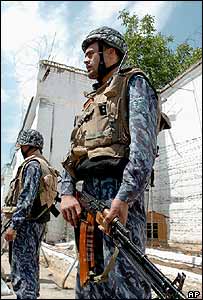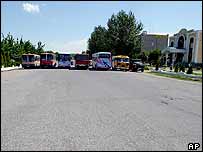
The visitors were told the restrictions were for their safety
|
As international pressure mounts on the Uzbek authorities following last week's bloody crackdown on protesters, foreign diplomats and journalists have been taken to the eastern town where the violence happened.
The Uzbek authorities are seeking to refute reports that soldiers shot dead hundreds of unarmed civilians, but those who went on the bus tour of Andijan have been left with unanswered questions.
The Uzbek government said 169 people died in the shootings, but a local army source told the BBC that 500 were killed.
The visitors saw buildings damaged in the violence - prison walls that were scarred with bullet holes, and broken furniture inside the main administrative building - but they were not allowed to visit the town's hospital or bazaar.
"We saw pretty much what they wanted us to see," said BBC cameraman Sanjay Ganguly.
From the bus, the visitors could see heavily armed soldiers, and tanks blocking side streets on their route - but very few ordinary people.
 |
 I was a bit surprised to find myself at the airport at 1230 and had hoped to have some time to wander around by myself, but they did say I was welcome to come back
I was a bit surprised to find myself at the airport at 1230 and had hoped to have some time to wander around by myself, but they did say I was welcome to come back

|
"They weren't letting people get anywhere near us and there were no cars on the street either. We hardly saw any people at all," said Bakhtior Imamov of the BBC's Uzbek service.
"We saw a few people as we were driving around - passers-by, people repairing the buildings that had been damaged during the violence.
"But on the whole, all of the streets that we were taken to were so completely cordoned off that even if you could have slipped away from the group for a moment, there wasn't anyone around to talk to."
UK demand
The visitors saw an army base where they were told a "criminal gang" had stolen weapons, and spent about 20 minutes at the prison which the protesters broke open. At the end of the tour, they spent about 10 minutes on Babur Square, where last week journalists reported seeing soldiers firing on a crowd of demonstrators.

The visitors said the tour yielded little information on the violence
|
At a police station, the visitors met the father of one of the 32 officials said by the authorities to have been killed in the violence.
"He left two children without a breadwinner to feed them. He was loyal to his country," said Tursunbai Rustamov - the only person the group met who was not an Uzbek official.
UK Foreign Secretary Jack Straw said the "inadequacy" of the tour underlined the need for diplomats, journalists and aid agencies to be given "full and immediate access" to Andijan and other areas of the country.
He has called for an independent international inquiry into the scale of the violence on 13 May.
Wednesday's visitors to Andijan were told by Interior Minister Zakir Almatov that it might be possible to visit a school where eyewitnesses had reported seeing hundreds of bodies. But those on the tour reported that their repeated request was later ignored by the local mayor's office.
After about two hours, the visitors were taken back to the airport, where UK ambassador David Moran and others tried to persuade a top Uzbek official to let them visit the town's bazaar, so they could talk to ordinary people.
"They're very concerned about security obviously," Mr Moran told reporters.
"I was a bit surprised to find myself at the airport at 1230 and had hoped to have some time to wander around by myself, but they did say I was welcome to come back.
"We remain concerned at the credible reports we received since Friday of casualties and we're keen to have the fullest possible picture."
The government has blamed the violence on Islamist militants and denied that troops and police fired on civilians.
But there are growing international calls for a clearer picture of what happened. The United Nations and European Union are among those calling for an international inquiry.



Bookmark with:
What are these?